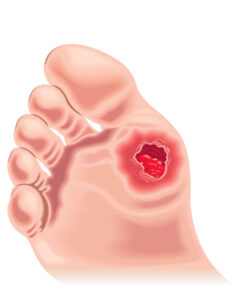 Many people who have wounds do not realize just how serious they can become if they are not treated promptly and correctly. Left unattended, some types of wounds can become infected. If an infection gets bad enough, it may become necessary to amputate the affected limb. These are just a few of the kinds of wounds that could result in amputation if a serious infection sets in.
Many people who have wounds do not realize just how serious they can become if they are not treated promptly and correctly. Left unattended, some types of wounds can become infected. If an infection gets bad enough, it may become necessary to amputate the affected limb. These are just a few of the kinds of wounds that could result in amputation if a serious infection sets in.
Diabetic Foot Ulcer
This is a wound that is allowed to fester because the person cannot feel it. Diabetes can lead to severe nerve dysfunction which makes a patient’s feet feel numb. As a result, he or she will not receive the pain signals necessary to realize that an injury has occurred. If a person walks on an inflamed area, it can turn into a deep blister that then turns into a wound. This often leads to an infection that will not heal because diabetes also affects the circulation system. The deeper the wound, the more difficult it will be to heal.
Diabetic Foot Infection
An open ulcer can allow dangerous bacteria to enter and quickly cause an infection. In many instances, an infection will run along a tendon and enter other areas of the foot or leg. There are some instances, however, where an infection can get into a bone, a condition known as osteomyelitis. If osteomyelitis develops, then the section of the bone that is infected may need to be removed.
Pressure Sores
Pressure sores can affect people whether or not they have diabetes. They normally occur on the area of the lower back just above the buttocks as well as the backs of the heels. A pressure sore is a type of wound that develops due to constant pressure on one area of the skin, typically due to lying in one spot for an extended period of time without turning. A pressure sore can also become infected and lead to amputation.
These are just a few examples of why it is so important to have a wound treated so that an infection does not set in. If you are concerned about a wound that has occurred on your body, please get in touch with us at DFW Wound Care Center. Contact us online or call 972-665-6292 or 972-318-2383 to schedule an appointment.
Contact us
Schedule an appointment
with our specialists by contacting us or calling our:
